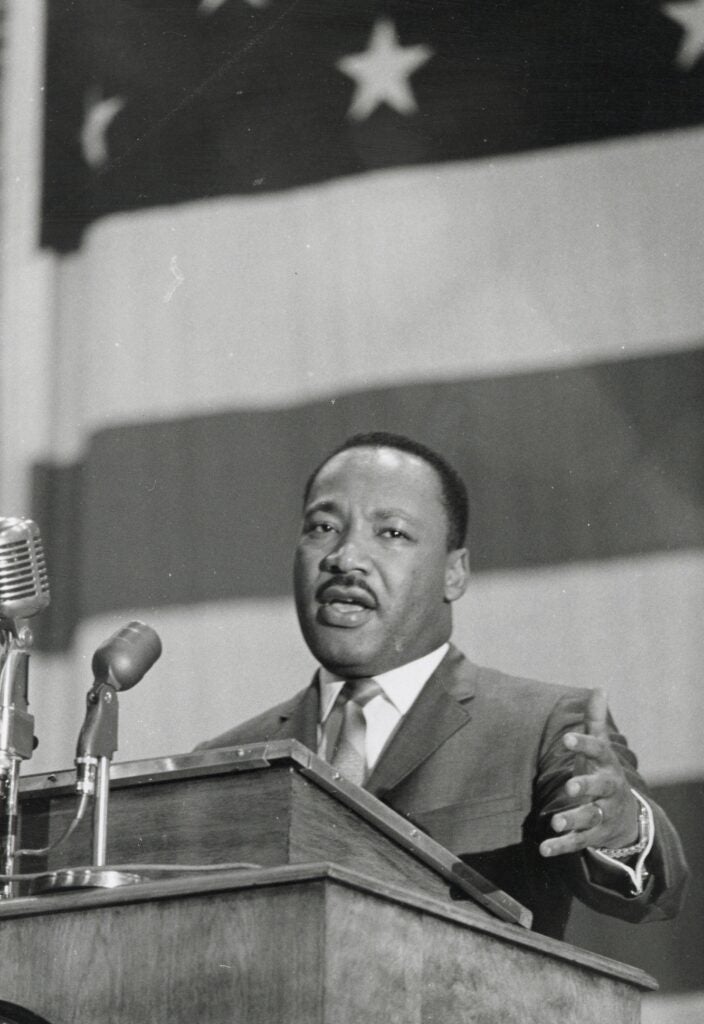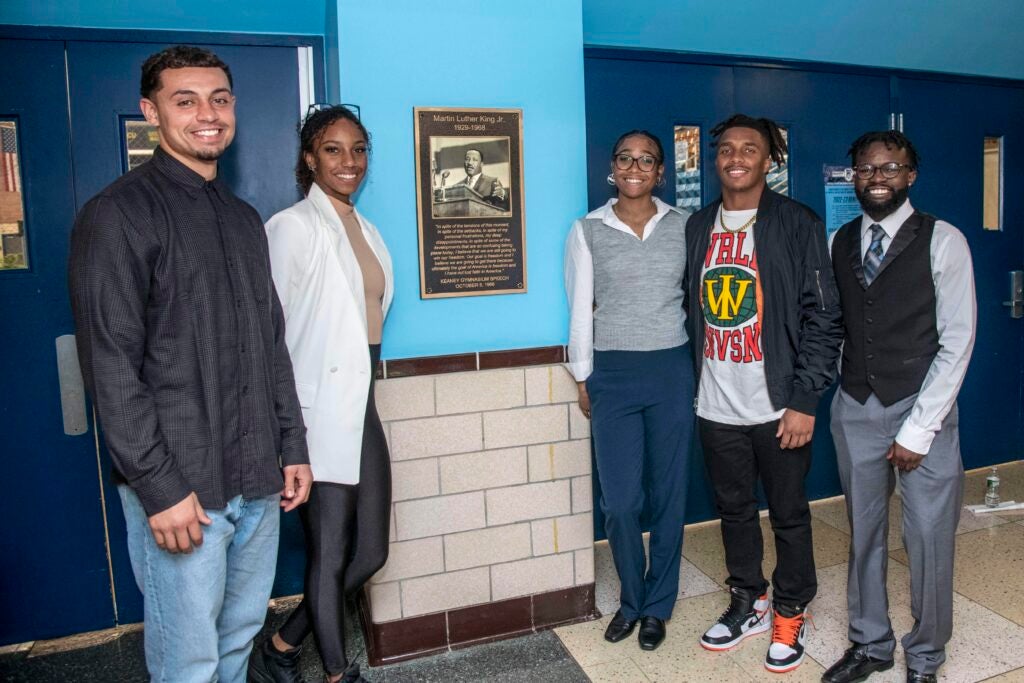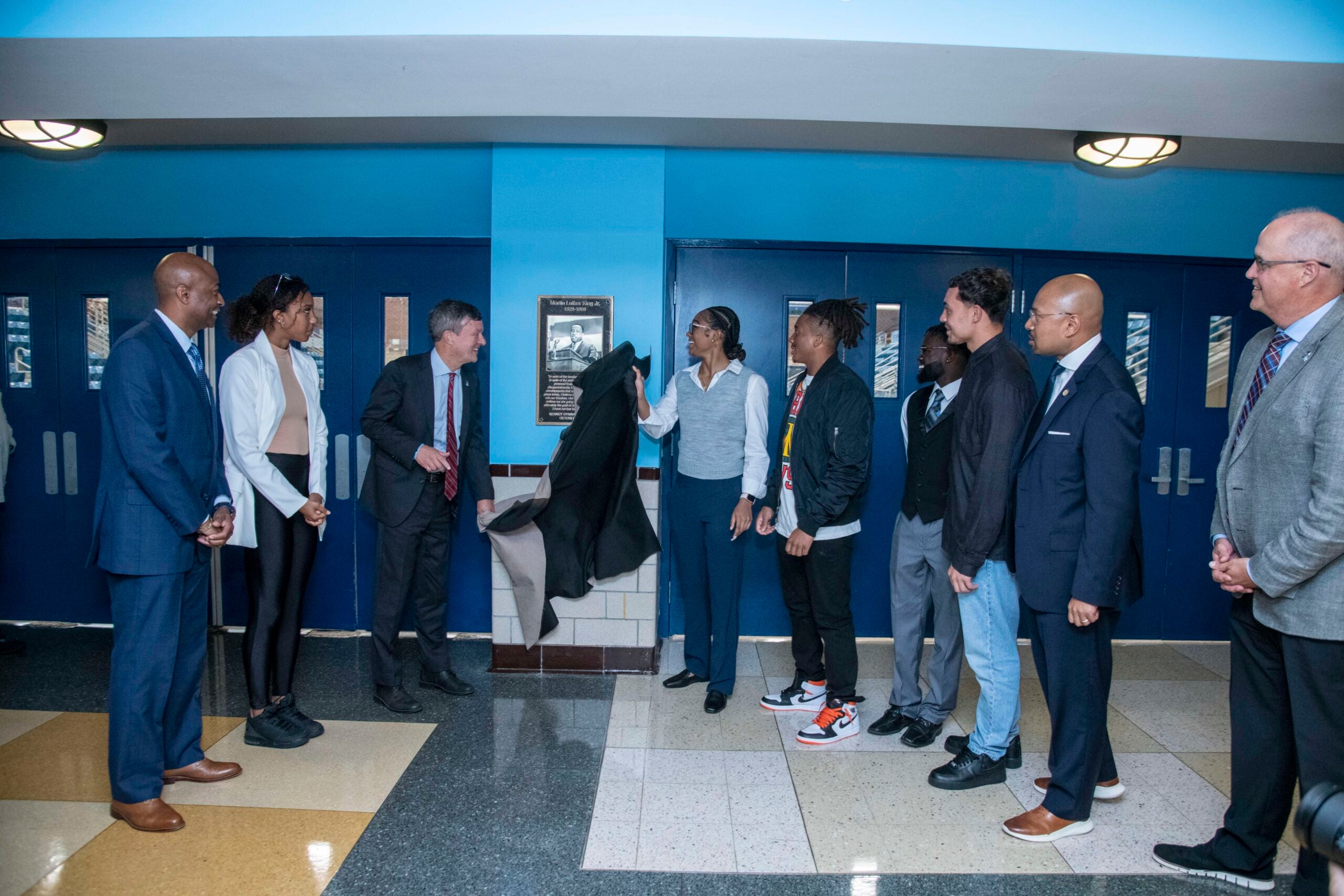KINGSTON, R.I. – Oct. 7, 2022 – “And as I discuss this and discuss the future of integration, I would like to use a basic thesis for our thinking together the idea that we have made significant strides, but we still have much to do.”
The words of Dr. Martin Luther King Jr. rang out again in Keaney Gymnasium at the University of Rhode Island. They were the words King spoke in a speech he gave Oct. 5, 1966, in Keaney before a capacity crowd of 5,000, which greeted the civil rights leader with a standing ovation and interrupted his 55-minute speech five times with applause, according to the next day’s Providence Journal.
On Thursday, excerpts from King’s 56-year-old speech were spoken by URI students Trinity Smith ’24, Emmanuel Gomes ’24, Hasna Badji ’24, John Erby ’23, and Daryl Mensah ’24 as the University honored the legacy of the Rev. King by dedicating a plaque in Keaney to commemorate his speech.

URI Vice President of Community, Equity and Diversity Sean Edmund Rogers greeted a crowd of more than 100 members of the campus community.
“King’s words that we as a nation have come a long way on the road to racial and economic justice, but still have a long way to go, ring as true in 2022 as they did when he spoke them in 1966 on our URI campus,” Rogers said. “The work of equity, diversity, and inclusion never really gets completed, and society must be willing to continually rededicate itself to the cause of justice. Today’s remembrance event and plaque dedication is a wonderful opportunity for our campus to reiterate its strong commitment to being a diverse and inclusive community.”
“I’m so pleased that we are about to memorialize this significant moment in our history – the nation’s history and URI’s history,” said URI President Marc Parlange. “What strikes me about this event, beyond the significance of his words, is that at 37 years old, he had already done more for the civil rights movement than had been done in the decades before.”
“In such a short time, Dr. King paved the way for so many and we wouldn’t be here today if it weren’t for his perseverance and his determination to stand up for what he believed in, for what he knew was right,” Parlange added.
Director of Athletics Thorr Bjorn added: “It is very special to be able to honor Dr. Martin Luther King Jr. and recognize the time he met with our students, faculty, and staff on campus. Dr. King’s message still means so much to our current student-athletes, coaches, and staff within the athletic department. It is terrific that we are able to memorialize just a small part of who he was and the lives he impacted.”

Smith, of Brooklyn, New York, a member of the Minority Student Athlete Crew, said it gave her chills to read an excerpt from King’s speech in the same room in which he spoke 56 years ago.
“It’s amazing to see how much the world has changed in comparison to when he gave this speech,” said Smith. “If I lived 56 years ago, I would not have been attending the University of Rhode Island. When Dr. King gave this speech, Black Americans faced a lot of discrimination and hate. Being that I am a young Black woman, attending this university would have been deemed unfit. The University of Rhode Island is still mostly white. However, the diversity here has skyrocketed in comparison to when Dr. King gave this speech. Dr. King was ahead of his time. We have come very far but we still have a long road ahead.”
Erby, of Chester, South Carolina, added: “Reading these excerpts was so important especially with the social climate we are in. The speech was powerful then, but was ahead of its time because of how relevant it still is. Much of what he spoke of we still deal with today. I just hope that the words are felt, understood, and connected to what is going on today, and not just heard.”
In his speech, Parlange pointed out King’s impact around the world, and here on the URI campus. “We see the strides we have made in achieving a more equitable, more diverse, more welcoming community where everyone has the opportunity to pursue their passion and to succeed,” he said. “We know we have accomplished so much but acknowledge that there is more work to be done.”
Part of King’s legacy can be found in the University’s Talent Development program, which was started in the aftermath of King’s assassination in 1968. Today, the special admission program for Rhode Island students of color and those from disadvantaged backgrounds has more than 4,000 alumni.
In closing the event, Rogers invoked the passion of Dr. King and noted that, while King is universally beloved today, he was not in his day. But King was not seeking popularity; he was putting forward what was right.
“As we celebrate the legacy of MLK right here on our URI campus, let us commit ourselves to the right course of action,” Rogers said, “and let us neither be dissuaded nor dismayed when our work in service to justice is met with disapproval and criticism and negativity and backstabbing and meanness and false accusation and resistance. Personal injustice is the high price paid for public justice.”
The 14-inch by 24-inch plaque was unveiled Thursday in the entrance hall at Keaney. A photo of King taken during the speech adorns the plaque, as does the words he delivered in Keaney:
“In spite of the tensions of this moment, in spite of the setbacks, in spite of my personal frustrations, my deep disappointments, in spite of some of the developments that are so confusing taking place today, I believe that we are still going to win our freedom. Our goal is freedom and I believe that we are going to get there because ultimately the goal of America is freedom and I have not lost faith in America.”

